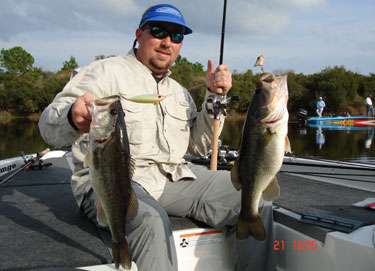
In the first installment of this two-part series, Elite Series pro Bernie Schultz discussed his methods for catching fall schooling bass while they're up and actively feeding.
Unfortunately, most of us aren't lucky enough to be within casting distance of the school when they're up and chomping on shad or other baitfish. We tend to reach the school a little late, after the visible action has stopped.
What can we do to catch some of these bass that just moments before were tearing up the surface of the lake?
"When I know I'm around schoolers, but they won't come up, I start working my way down through the water column," says Schultz. "The fish really aren't feeding anymore at this point, and you have to go finesse on them.
"I call it fishing by Braille. One of the first baits to try would be a Senko or a Zoom Fluke. These baits fall slowly, but can pick off bass that are just below the surface and that have stopped actively feeding."
As the bass get deeper, Schultz follows them out with other baits.
"Crankbaits like Rapala's Shad Rap and DT series are great for this," he says. "Just try to match the baitfish and work progressively deeper until you contact fish. It's a process of elimination."
Once he's worked through that portion of the water column that he can reach with a crankbait, Schultz reaches for a Carolina or drop shot rig and works the bottom.
"The Carolina rig is good when you're trying to cover some water and locate the fish again," he says. "It offers you a more horizontal presentation. The drop shot is typically a better choice if you can spot them on your electronics and need a more vertical approach. I often use soft plastic baits that mimic the look of the baitfish they were feeding on."
If the soft plastic approach with the Carolina and drop shot rigs doesn't work, Schultz has one more option, but it's not his favorite.
"For me, blade baits like the Silver Buddy or jigging spoons are the last ditch effort for chasing these schooling bass that have stopped feeding at or near the surface," he says. "These baits can do a good job of emulating the forage, but they're my last choice. I usually feel like I have a better chance with one of the other methods."
Wherever he finds them, schooling bass usually put a smile on Schultz's face, and for good reason.
"There's no faster way to put a bunch of fish in the boat," he says.




